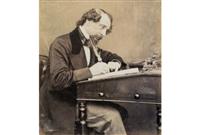|
|
||||
|
by Betty Jo Tucker  In addition to the many film versions of A Christmas Carol, most of Charles Dickens’ other novels have also been made into movies (Oliver Twist, David Copperfield, A Tale of Two Cities, and so forth). If Dickens were alive today, I’m certain he would be involved in the movie business and willing to share his opinions with us. That explains why my imagination went wild back in 1995, giving me the opportunity to interview this great author concerning the movies of that year. Below are some highlights from our unusual session. TUCKER: Mr. Dickens, how would you summarize this past year in terms of film accomplishments? DICKENS: Not to put to fine a point on it, I believe 1995 was the best of times and the worst of times for moviegoers. TUCKER: What do you mean by “the worst of times,” Mr. Dickens? DICKENS: For one thing, it was the year movies became too unbearably loud. Now I admit to using considerable noise in some of my work (especially the ghostly visitations to Ebenezer Scrooge), but the sound people for Money Train and Strange Days went completely out of control. My ears haven’t been the same since seeing these films. TUCKER: Was there anything else you disliked about the movies during 1995? DICKENS: Well, although I’m no stranger to depravity – having covered such ugly violence as Bill Sykes’ murderous rage in Oliver Twist – I still feel that during this past year movies reached new depths of bad taste with Showgirls and Jade, both written by our highest paid screenwriter, Joe Eszterhas. I offered my services as a script doctor on these films, but Joe turned me down. TUCKER: What did you mean when you said 1995 was also the “best of times” for moviegoers? DICKENS: Happily, this past year we saw a resurgence of intelligent, humanistic dialogue in such gems as Smoke, Don Juan Demarco, Living in Oblivion, The American President, Leaving Las Vegas, and Circle of Friends. I am very pleased by this trend and also by Sean Penn’s writing and directing of The Crossing Guard – one of the most remarkable cinematic storytelling achievements of recent years. TUCKER: What is so remarkable about that particular film? DICKENS: Mr. Penn masterfully combines dramatic images, compelling dialogue, and intense background music to tell about a father’s vengeance against a drunken driver who killed his daughter. I admire the way he includes the importance of redemption as a key element in this thought-provoking film. Of course, the themes in this movie are very familiar to me, although I dealt with them in a different way in A Tale of Two Cities and Oliver Twist. TUCKER: Do you have any thoughts about what movies will be like next year? DICKENS: I fear our eardrums will still face some hard times, but I have great expectations for more films based upon well-written screenplays. (Originally posted in San Diego’s Forum Publications and reprinted in Confessions of a Movie Addict, published by Wheatmark.)
|
||
|
© 2024 - ReelTalk Movie Reviews Website designed by Dot Pitch Studios, LLC |




